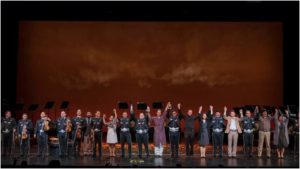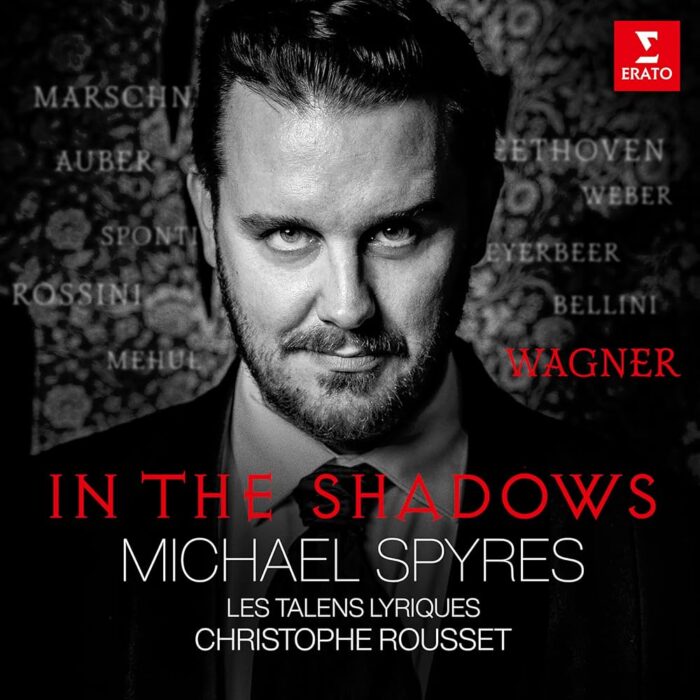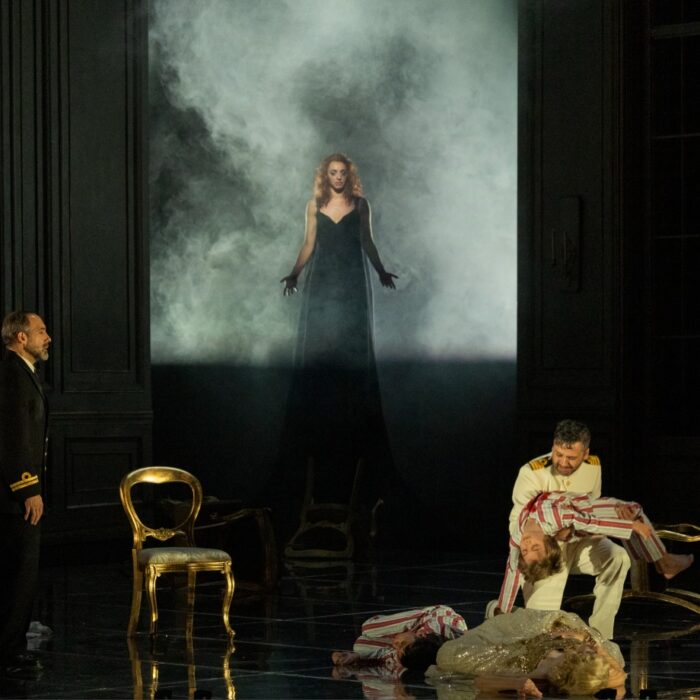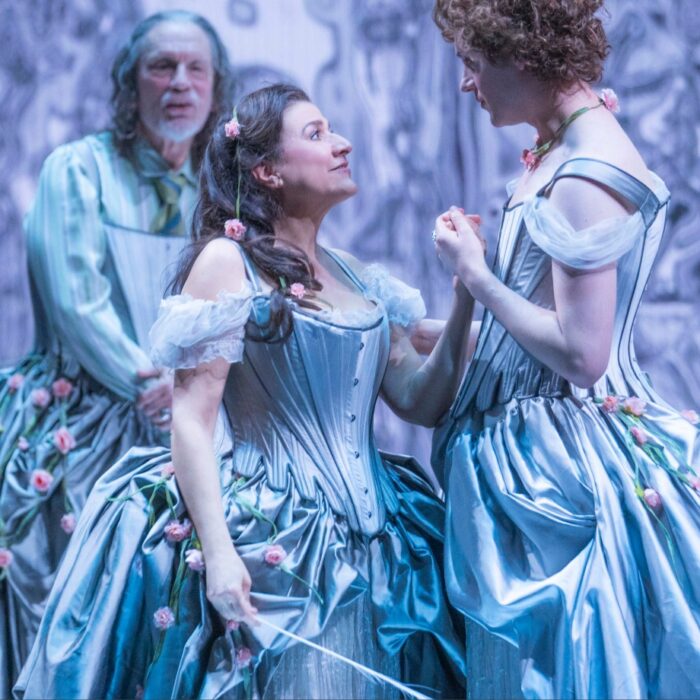
New York City Opera 2017-18 Review – Cruzar la Cara de la Luna: A Revelatory Experience That Puts the Current Immigration Landscape Into New Perspective
By Matt CostelloTo begin, I’m not sure I can – in mere words – really convey the experience of seeing the New York City Opera’s production of “Cruzar la Cara de la Luna (To Cross the Face of the Moon).”
I will, of course, attempt to do just that, but when a musical experience is both sui generis and yet – and this is the amazing thing – very much an opera, to capture the feelings, the music, the emotion is challenging indeed.
And as this is a “mariachi” opera we are talking about, and that alone would make one alert that something quite different, potentially special is on offer.
And you’d be right.
A Different Experience
Even before the opera began, something was in the air of the perfectly-sized Rose theater, a hall with great sightlines and warm acoustics.
First, there were families.
Mom, dad, maybe grandma. Small kids who might wiggle some. Not a sea of them, by any means, but clearly some families who felt it was important to see this show, to be there.
And with everything in the news about immigration and DACA, the story of this show, the journey north for work and survival, the sacrifices, the loss, the heroic tale of a people – could it resonate anymore?
Doubtful.
But it is the music here that — well before we embrace the characters of the story — grabs one, and does not let go.
The brilliant mariachi orchestra, the band is on the stage. And yes, in full mariachi band-regalia, wearing giant sombreros at the start and then again, when the mood, music and moments suits.
The violins to the left, shimmered sometimes, and at other times were percussive — almost as much as the quartet of guitars and the powerful blasts from the absolutely perfect trumpets.
More on that shape and form of that music, composed by the late, great mariachi master José “Pepe” Martinez, in just a bit. But first to that story.
An Emotionally Compelling Story and Characters
The story soon — and emotionally — grabs you. It had me moved and exhilarated, drawn by a simple tale both tragic and beautiful – the husbands’ journey north, and the wives who wait.
And besides the cast (all amazingly good), those same violins would often lower their bows and serve as an exuberant chorus. Definitely not Greek, but serving a similar, classic purpose.
At one point, Laurentino (whose migrant life we see, jumping back and forth in time) must face his wife Renata who argues and pleas for his remaining home, near his family, near his country — versus chasing the money and allure of the States.
The violinists-turned-chorus then engage in a boisterous argument with a feisty Renata, taking the husbands’ view that this dangerous trip for the needed money (and openly admitted freedom) was a good thing. Maybe even a necessary thing.
The book and lyrics of the opera are by Leonard Foglia who brings an understanding of modern opera (such as Dallas’s “Moby Dick”) as well as extensive stage credits. The theatrical power of the story and characters are there from the moment the piece begins.
And despite the clear sadness of the story, there is much humor, much life, much joy. You’d laugh (as I often did) even as there are tears in your eyes.
It’s that good.
A Mariachi Opera?
And is it an opera?
Certainly, if you take the original meaning of that Italian word; it is a “work.” And a “work” much like the earliest operas, with elements that will be familiar to any denizens of the Met – and yet other moments probably only familiar to anyone who has travelled south of the border.
But arias, duets, quartets abound. As do moments of singspiel, used to powerful effect in the piece. And the libretto would certainly resonate with Puccini (hints of “Manon Lescaut” perhaps?) or any of Verdi’s masterful scenes of father and daughter, generations tied by love and loss.
But it is ultimately the cross-generational nature of the story that makes it so effective.
Laurentino’s grandson, Mark, in present day New York, is sung by Efrain Solis with wisdom and power. He stands by the dying old man as the grandfather (the equally brilliant Octavio Moreno) jumps back and forth in time, from his death bed, to courting his wife, to becoming a father, his full, rich, and challenging life on display.
Through that “window” of time, we will also see his greatest loss as his wife, Renata, powerfully sung by Cecelia Duarte, attempts to travel north to join her husband. Duarte’s voice soars and glides with a crystalline beauty. Like the part of Laurentino, her character encompasses humor as well longing, and finally the tragedy of her death at the border itself.
Was the whole theater in tears?
I would not have been surprised.
But the richness of the characters and the cast do not end there. Laurentino’s very American granddaughter, Diana, is played by Maria Valdes, a symbol of how one generation later, the children do truly become American. And when she finally sings, her father reunited with a brother he never met, it was simply a tremendous, soaring moment.
And I am completely sure people left that theater talking about Vanessa Alonzo, who sung Renata’s friend, Lupita — another wife with a husband lost to the trek for work and money. One’s heart beat a little faster when she was on stage, that mariachi voice commanding, a force to be reckoned with.
And when the Spanish speaking son Rafael finally appears from Mexico to Laurentino’s deathbed, tenor Daniel Montenegro leads a quartet that can stand with the best of the art from.
So yes, “Cruzar” is a true opera, even with the sombreros, the brassy trumpets, and the violinists who launch into rambunctious shouts and whistles as well as make your heart break,.
And in the end, this is a show about the impossible.
To make the family whole again.
And realizing, that families always struggle to be together…and probably every family must deal with that, whether facing a real border, or not.
The Music of Jose “Pepe” Martinez
And a few more words about the music itself.
“Cruzar’s” core is full-throated mariachi, the likes of which you have perhaps not heard before, with a expressive, exuberant force.
But equally, there are moments where the strings and music slips into a Nelson Riddle-like suppleness that reminded me of supposedly simpler times of lush bands, the great signers, and fully composed soundtracks of classic films.
At times like that, those strings bring home the intimate story that is on the stage here. And when that music turns, for lack of a better word, “operatic,” we see this unique hybrid as a natural extension of the art from of opera.
The merging of music and story, classical voices singing in familiar way and then, so very differently.
An Effective Staging
Much like NYCO’s “La Fanciulla del West,” Foglia’s direction and staging here artfully uses backdrops and props, all working in an effective, very theatrical way. With the metaphor of caterpillars and monarch butterflies central to the tale, at different times the entire stage became filled with plummeting orange “butterflies.”
They land everywhere, around all the characters and even amidst the mariachi players. Those paper monarchs reminding us of that great journey, the butterflies’ journey from America and then back to a small dusty Mexican village.
What is such a journey like? Can we imagine it at all? After seeing and hearing this, you might.
And besides that, you may also find the raw emotion on stage surprising, shocking, and even unsuspectingly powerful. It catches you off-guard.
It is quite simply one of best musical experiences I have ever seen.
Back to Reality
As you leave the Time Warner Center and make your way to the reality of 59th street outside, heart and mind still with that show, the characters, the music, you go through revolving doors, and there’s a hotel across the street.
With a name on it. Familiar. Famous. Maybe – sorry – infamous.
Reminding all leaving — those families too I imagine — that this show, its subject, its message. These days, not a distant one at all.


